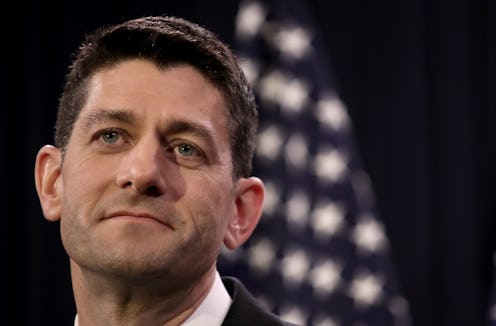News
How The House Could Choose The Next President
There's been a lot of talk of Republicans having a contested convention this year, which could result in a candidate who didn't win the most delegates becoming the nominee. The undemocratic nature of this possibility has outraged a lot of people, but it's unfortunately not an isolated case. Undemocratic rules abound in U.S. politics, and there's even a situation wherein the House of Representatives could pick the next president. It's a scary thought — but it's happened before, and could happen again.
The House of Representatives selects the next president if no candidate wins a majority of electoral votes in the general election. (The electoral college itself is highly undemocratic, but that's a topic for another day.) In 2016, 270 electoral votes constitute a majority, and there are two ways that the election could proceed without anybody winning 270.
In the first, two candidates fight each other to a draw, and both end up winning exactly 269 electoral votes. That's mathematically possible, and according to the helpful electoral map website 270ToWin, there are about 32 ways the electoral college could tie if we assume that safe red and blue states won't flip in November. (There are many, many more routes to a tie if we don't make this assumption.)
The second way to get an electoral tie would involve a third-party candidate entering the race and winning one or more crucial states. Such a candidate wouldn't need to get the most electoral votes. They'd simply need to win enough states to prevent either of the other two candidates from getting 270 electoral votes. They could even accomplish this by winning a just one state, and there's historical precedent for that. In four elections since 1900 (and several before), a third-party candidate has won the popular vote in at least one state.
In either situation, no candidate would have a majority of electoral votes, and the House would get to pick the next president. But the House wouldn't do this the normal way, where each lawmaker casts a vote and all of the votes are weighted equally. No, that would be far too democratic for a place like the United States.
When the House of Representatives is tasked with breaking an electoral college tie, each state gets a single vote, regardless of how many representatives come from the state. So, while California's 53-member delegation is holding an internal vote to determine which candidate will get the state's vote, Wyoming's lone congressional representative gets to decide, by him or herself, where Wyoming's vote will go.
Because there are 50 states, whichever candidate won over 26 or more states' delegations would become the next president. If no candidate won a majority, the voting would continue until someone did. If repeated subsequent votes still failed to produce a new president, we'd have a constitutional crisis on our hands.
The prospect of the House choosing the next president may seem absurd, but it's happened three times in the past. The elections of 1800, 1824, and 1876 all resulted in no candidate winning a majority of electoral votes, and in all three cases, the House eventually chose the president.
The closeness of both the Democratic and Republican primaries has placed an enormous media spotlight on each party's nominating rules, and as a result, a lot of Americans are learning that the process by which presidential candidates are chosen isn't very democratic. But general election laws can be just as undemocratic, and if the electoral college ends up in a tie, the result will make the primaries look like a harmonious walk in the park.
